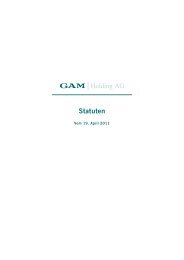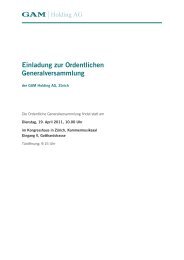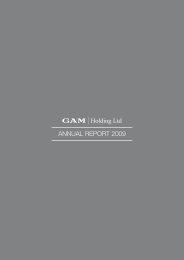2005 Annual Report Julius Baer Holding Ltd. - GAM Holding AG
2005 Annual Report Julius Baer Holding Ltd. - GAM Holding AG
2005 Annual Report Julius Baer Holding Ltd. - GAM Holding AG
You also want an ePaper? Increase the reach of your titles
YUMPU automatically turns print PDFs into web optimized ePapers that Google loves.
Notes<br />
mulated translation differences in the shareholders’<br />
equity.<br />
In the individual financial statements of the Group<br />
companies, income and expenses denominated in foreign<br />
currencies are translated at the rate of exchange<br />
on the date of the respective transaction. Assets and<br />
liabilities are translated at the closing exchange rate<br />
on the balance sheet date. The resulting gains and<br />
losses on monetary assets and liabilities are recognized<br />
in the income statement as currency gains/<br />
losses. Unrealized exchange differences on nonmonetary<br />
financial assets (investments in equity<br />
instruments) are a component of the change in their<br />
entire fair value. For non-monetary assets classified<br />
as held for trading, unrealized exchange differences<br />
are recognized in the income statement. For nonmonetary<br />
financial investments classified as available<br />
for sale, unrealized exchange differences are<br />
recorded directly in shareholders’ equity until the<br />
asset is sold.<br />
Based on the revised provisions of IAS 21, the<br />
reporting currency of several Group companies was<br />
changed from the Swiss franc to the respective<br />
functional currency. The effect of this change is not<br />
material.<br />
Consolidation period<br />
The period covered by the consolidation is the calendar<br />
year for all participations.<br />
Accounting policies and valuation principles<br />
The drawing up of the balance sheet and valuation of<br />
all Group companies is performed in accordance with<br />
uniform guidelines. These guidelines remain the same<br />
as in the previous year.<br />
<strong>Report</strong>ing of transactions<br />
All completed transactions are reported and valued.<br />
Foreign exchange and money market transactions are<br />
posted to the balance sheet on the value date. Until<br />
70 JULIUS BAER GROUP<br />
the value date, they are stated in the off-balancesheet<br />
transactions. Spot transactions in securities<br />
and securities underwriting transactions are posted<br />
to the balance sheet on the contract date in the<br />
Group. According to IAS 39, all financial instruments<br />
shall be assigned to one of the four categories<br />
(“loans and receivables,” “held-to-maturity investments,”<br />
“financial assets and financial liabilities at<br />
fair value through profit or loss,” and “available-forsale<br />
financial assets”) and uniformly recognized<br />
within these categories on the settlement date or the<br />
trade date. The divergent recognition of securities<br />
transactions, cash transactions and securities underwriting<br />
transactions within the four categories mentioned<br />
above does not have a significant effect on the<br />
balance sheet reporting.<br />
Income from services is recorded at the time the<br />
service is performed, i.e. upon execution of a transaction<br />
or in the corresponding periods over the life of a<br />
contract.<br />
Income and income components that are based on<br />
performance are recorded at the time in which all<br />
performance criteria are fulfilled.<br />
Money market instruments on the assets side and on the<br />
liabilities side<br />
Claims and liabilities are valued at their amortized<br />
cost using the effective interest rate method.<br />
Due from banks and customers, mortgages<br />
Amounts due from banks and customers as well as<br />
mortgages are initially recognized at fair value.<br />
Impaired claims, i.e. claims for which it is unlikely<br />
that the counterparty will be able to fulfill its future<br />
obligations, are valued on an individual basis, and<br />
specific valuation adjustments are established for<br />
impaired amounts. Off-balance-sheet transactions,<br />
such as firm commitments, guarantees or derivative<br />
financial instruments, are also evaluated. Impaired<br />
claims are classified as non-performing no later than












